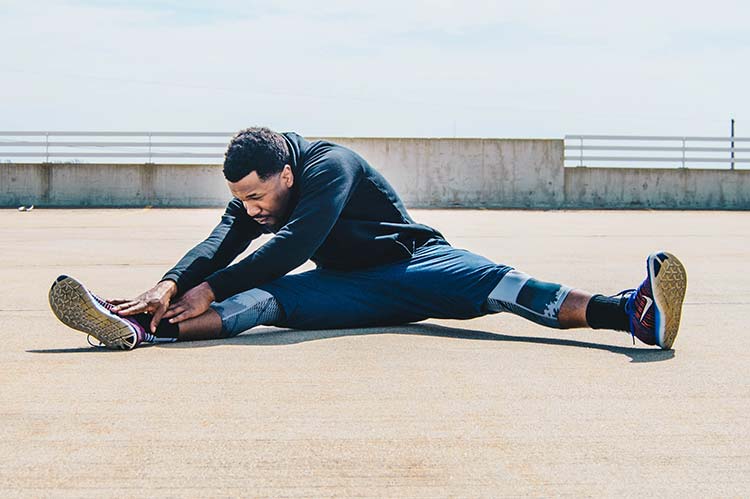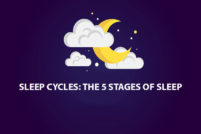Are you getting enough sleep every night?
Under-sleeping is so common these days that many people don’t even realize that they’re not getting enough. Between work, social commitments and family life there are so many reasons we are going to bed later and waking up earlier. But why does this matter?
Sleep plays an important role in nearly every aspect of your emotional and physical health. By tucking in for the recommended amount of time each night you’ll take full advantage of all the amazing benefits of a good night’s sleep.
Emotional Benefits

Getting enough sleep can have enormous effects on our emotional stability. Ever had a stressful day after a short night and found yourself getting angry and frustrated quickly? Don’t blame yourself – blame your lack of sleep. Here is how sleep can influence our emotional balance.
Reduces Stress & Anxiety
While it’s been known for a long time that high levels of stress and anxiety are a leading cause of insomnia, new research shows that the link goes both ways. People who suffer from chronic sleep deprivation are at greater risk of developing an anxiety disorder,[1] and they report higher levels of stress than their well-rested counterparts.[2]
Fights Depression
Over time, a lack of sleep slowly chips away at your happiness, and increases your risk of developing depression by up to 10 times.[3] In contrast, a study has shown that tacking on just one extra hour of sleep each night can increase your level of happiness by as much as a $60,000 raise.[4]
Decreases Impulsivity
Through the same mechanism that sleep deprivation alters your mood and emotional state it also increases your tendency to act impulsively. When you’re lacking sleep you’re more likely to jump into action before properly assessing the situation, especially when emotions are high. [5] Getting enough sleep prevents you from making rash decisions.
Improves Communication
As lack of sleep reduces your ability to control your emotions, your relationships suffer. Research indicates that when just one party in a relationship is sleep-deprived the pair is more likely to experience conflict. Not only are sleepy people less able to hold back negative emotions, but they’re worse at conflict resolution.[6] Getting enough sleep might just save your relationship.
Mental Benefits

Ever tried to work on a project or learn for a test on just a few hours of sleep? Then you know that it can be almost impossible to be productive when you lack sleep. And not only that – we tend to make more mistakes and make more bad decisions when we lack sleep. Here are some of the mental benefits of sleep.
Increased Productivity
The lack of energy, difficulty concentrating and other effects of sleep deprivation combine to lower your productivity. Sleepiness itself can manifest as a lack of motivation, leaving you struggling to tackle even the simplest of tasks.
A study completed by Harvard revealed that insomnia is responsible for a loss of productivity equivalent to 11.3 days’ worth of work each year.[7] On the other hand, sleep can improve your productivity so you can complete your projects faster and at a higher quality.
Better Reaction Time
When you’re overtired your reaction time is significantly reduced, as demonstrated by in-lab studies on quick-decision-making.[8] Even if you’ve already performed a task before, a lack of sleep limits your ability to respond quickly and effectively when the time comes. So if you have to rely on your reaction time – get some sleep!
Better Decision Making
When you’re sleep deprived your ability to make decisions is compromised. It becomes difficult to properly assess situations, formulate plans and select the correct move.[9] As we will discuss later, this impairment in judgement can have significant consequences.
Improved Memory & Learning
Sleep plays an essential role in committing information to memory as well as learning how to carry out new tasks.[10] However, lack of sleep not only impacts your ability to form new memories, but also makes it difficult to access previously stored information.[11]
Physical Benefits

Sleep gives our body time to recover and rebuild. If we get enough sleep we build muscles faster, stay fit longer and it even improves our skin.
Stay Fit
When you’re well-rested you’re more likely to feel like working out. Not only will you be more motivated to hit the gym, but you’re also more likely to exercise at the necessary level to promote cardiovascular health. Even if you have a dedicated workout routine, it’s important to balance rest (sleep) and work in order to maximize positive health outcomes.
Skin
Getting the sleep you need doesn’t just improve health on the inside, but also makes you look better. Without proper rest your body draws nutrients away from surface (aka your skin). This contributes to dryness, the development of wrinkles and of course eye bags and dark circles.[12]
Build Muscle
Muscles require rest in order to recuperate and build new tissue. This means that getting the right amount of sleep actually increases the results of your workout. Without this period of rest, muscles are overworked and can actually deteriorate.[13]
Reduce Pain
Pain specialists are well aware of the connection between sleep and chronic pain. Getting adequate sleep decreases pain sensitivity and improves your ability to handle pain, both emotionally and physically.[14] Sleep is also an essential part of the healing process, and can help speed up recovery from injuries.
Weight Control
Lack of sleep causes your body to hoard energy, which is then stored as body fat. Consequently, not getting enough sleep makes it harder to lose weight or maintain it.[15] This also means that you’ll experience more food cravings while overtired, especially for those high in sugar and fat content.
Sex Drive
Research shows that getting more sleep leads to a better sex life. For women, each hour of additional sleep increases sex drive by an average of 14%.[16] Meanwhile, men who regularly sleep less than 5 hours per night experience a loss in testosterone that’s equivalent to 10-15 years of aging.[17]
Health Benefits

If you suffer from health issues you might want to make sure you are getting enough sleep. Not only do you get less sick…you also help your body to fight health issues you already have.
Less Sick
Alongside reducing your risk of developing serious illness, getting enough sleep also helps ward off the common cold and flu. Sleep boosts you immune system and keeps it running smoothly so that you are better protected from these everyday threats.[18]
Diabetes
When you’re not getting enough sleep your body needs to find another source of energy: sugar. In fact, people suffering from sleep disorders are often found to have high blood sugar due to this. When sleep deprivation becomes chronic, the body responds in a way that resembles insulin resistance, which can develop into diabetes if left unchecked.[19]
Migraines & Headaches
If you suffer from frequent headaches or migraines, your sleeping habits may be to blame. Research shows that lack of sleep increases headaches by causing an imbalance in the brain chemicals serotonin and dopamine. If you’re awoken by an alarm during REM sleep this effect is even more pronounced.[20]
Heart Health
Sleep helps regulate a variety of body functions that contribute to heart health, including glucose metabolism, blood pressure and inflammation. According to the Sleep Foundation, getting less than the recommended sleep each night doubles your risk of developing cardiovascular problems, regardless of the presence of other risk factors such as smoking, body weight and exercise.[21]
Cancer
Lack of sleep disrupts your immune system, causing widespread inflammation throughout the body which in turn increases your risk of developing cancer. Additionally, the sleep hormone melatonin has been shown to act as an antioxidant — preventing and reversing cellular damage which contributes to cancer.[22]
Reduce Accidents
The many side-effects of sleep deprivation combine to increase your probability of being involved in an accident. Driving and work related accidents may result from both from the inability to make quick decisions and slowed reflexes.[23] With even greater levels of sleepiness there is even a risk of falling asleep at the wheel.
Whether you’re looking to improve your performance at work, relieve stress or simply want to maintain your health, there are so many reasons you should work on improving your sleep. While you should always discuss serious sleep-related symptoms with your doctor, there are many steps you can take to naturally increase the amount of sleep you get.





